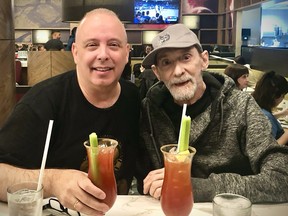Never in the closet, Banks organized the city’s first Pride event in 1979, and never stopped fighting for the community.

John Banks, an ardent defender of the LGBTQ2S+ cause and of the community’s rights and freedoms and the organizer of Montreal’s first Pride event 45 years ago, has died. He had been in declining health for some time.
The news was made public Monday by the Archives Gaies du Québec (AGQ). Banks, who would have turned 81 on July 3, was a dedicated and longtime volunteer with the organization, which works to document the history of the province’s LGBTQ2S+ communities. “More than simply the memory of things, the archives are an object lesson in what was,” he said to explain his devotion.
Born in Montreal in 1943, Banks affirmed his sexual identity early. “I was never in the closet, so never had a coming out,” Banks said in the 2018 AGQ documentary John Banks, une vie d’engagement.
In 1979 Banks convinced a few friends to demonstrate under the name “la Brigade Rose” in St-Louis Square. There were 52 of them, including several women. There was no rainbow flag yet, so they sewed together two sheets and fashioned a triangle they painted pink. “That was our parade and we were proud,” Banks would recall.
It was Montreal’s first Pride event.
The year marked the 10th anniversary of the Stonewall riots, which began on June 28 when the Stonewall Inn, a gay bar in New York City’s Greenwich Village, was raided by police. Rather than respond with the compliance police expected, patrons and a growing crowd decided to fight back. Five days of rioting marked a turning point in gay and lesbian life.
“When John organized the first march in 1979, 52 people turned out. A lot of people were still closeted,” recalled Richard Burnett, a Montreal journalist for mainstream and LGBTQ2S+ publications and a longtime friend of Banks.
The LGBTQ2S+ community was targeted in police crackdowns on Montreal gay bars in the In the 1970s and 1980s — and even later. Against a backdrop of the HIV/AIDS pandemic, which began in 1981, and a series of gay murders in Montreal in the late 1980s, the raids continued. In the early hours of July 15, 1990, police raided the after-hours venue in a downtown Montreal loft known as as Sex Garage. “The queer community was under siege,” Burnett recalled.
Marches took place over the next decade but the first Pride parade was in 1993. Organized by the Divers/cité organization, it drew 5,000 people.
“It was very powerful for John to see: He told me he wept,” said Burnett. “He never thought he would see a Pride parade in his lifetime. He was 15 when he started frequenting gay bars. Queer nightlife was very much underground then — a demi-monde. Consensual gay sex was illegal. John was really out and proud. There was no closet for John.”

Banks did many different things during his lifetime. He was just 17 when he met then-59-year-old Marlene Dietrich in 1960 in Montreal, where she was giving a concert at Her Majesty’s Theatre. She was no longer doing movies and was now producing cabaret shows. The encounter would lead to his being hired as her personal assistant, a job he held for 12 years. “She was my university,” Banks told Burnett of his time with Miss D, as he called her.
In the 1970s, he owned a Duluth Ave. restaurant, Au Jardin. He hosted a program on Radio Centre-Ville and established a short-lived magazine, Sortie, intended to describe the realities of life for the LGBTQ2S+ community.
Divers/cité organized the Pride parade in Montreal until 2006 and Fierté Montreal/Montreal Pride was established in 2007 to organize the parade and related community days: Today they make up the largest LGBTQ2S+ festival in the francophone world, said Burnett. In 2019, total attendance at the Montreal Pride festival was 3.4 million.
Speaking with reporters on Wednesday in the Village, Mayor Valérie Plante described Banks as a pioneer. Montreal’s Pride event has grown so big that “we tend to forget that, when it started, those people had a lot of courage to be out there in the street … asking to be respected in their own identity” when there were few public conversations about gender or homosexuality.
Said Burnett: “John was so out and proud. For him, it was a lifelong commitment. He felt this was something he had to do, which is why he started Pride. He felt a deep commitment and it’s that deep commitment that everybody loved and respected him for it. I have always said he was a role model and a personal hero.”
Even as his health declined, Banks remained connected and committed to the queer community. “A lot of writers and researchers would approach me and ask me questions about life for gay people and John was a great resource,” he said.
“We have now lost one of our last living connections to the history of gay Montreal. He made a difference. He helped change our city.”
Banks saw societal acceptance of the LGBTQ2S+ community evolve considerably in his lifetime. “It still worries me that it’s not perfect,” he said in a CBC podcast not long before his death. “But it’s a hell of a lot better than it was.”
The last time Burnett saw Banks in person was on Dec. 29, 2023, when he took him out for brunch. “We did a lot of catching up over scrambled eggs and Bloody Caesars! He was quite frail by that time, but still charming as ever. He was a great storyteller and a fierce queer activist who helped change queer life in this city for the better. I loved him and we will all miss him.”
AGQ coordinator Pierre Pilotte said of Banks’s passing: “It’s a huge loss for our communities. We will miss his activism and unwavering commitment.”